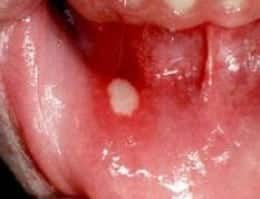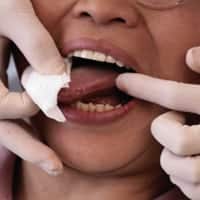Cancerous Growths in the Mouth
Oral cancer doesn’t get the attention it deserves. When was the last time you saw a marathon for the prevention and cure of oral cancer? When was there ever an oral cancer awareness month, or even a week, or day? Oral cancer is dangerous and deadly. Thousands of people die from this disease. The mortality rate from this particular cancer is extremely high, due to late detection and diagnosis. Hopefully, we can bring information and awareness of this horrible disease into the light a little further, and help everyone understand what preventative measures can be done to avoid this.
What are the signs and symptoms of oral cancer?
Oral or mouth cancer, a subtype of head and neck cancer, is a cancerous growth in the tissue of the oral cavity or the oropharynx (the part of the throat at the back of the mouth). Basically, oral cancerpresents as lesions, lumps or ulcers on the lip, tongue, cheek tissue, behind the wisdom teeth, the salivary glands, tonsils or even behind the ear. These areas may start out looking discolored, and can be painless in the beginning. As the cancerous cells infect more and more tissue and the area grows, the area can become very painful, including a burning sensation.

If you experience anything like this, and it doesn’t start resolving itself after 14 days, see your doctor. Oral cancer, when left untreated can result in death. In 2013 it is estimated that over 41,000 new cases of oral cancer occurred and more than 7,000 people died from oral cancer. Granted, even after oral cancer is detected, survival is not guaranteed. There are many vicious forms of oral cancer that modern science can not yet cure.
How does one get oral cancer?
There are certain known risk factors that may result in oral cancer. Smoking cigarettes and alcohol are the most widely proven of these factors. Chewing tobacco is another highly proven factor. Ultraviolet light waves is another risk for causing lip cancer, as well as skin cancer. Oral irritations, such as improperly fitted dentures, broken mouthguards and broken braces can result in minor versions of oral cancer. The American Cancer Society also states certain overly processed, refined foods can create a higher risk factor for developing oral cancer. There is also a theory that HPV can be loosely related to certain oral cancers, but the studies are not conclusive.
How can oral cancer be prevented?
First off, avoid known and proven risk factors. Do not start smoking or chewing tobaccos. If you are a smoker or chewer, quit. There is a myriad of health related concerns involved with smoking and chewing, oral cancer is only one, but can be a very serious one. Wear proper protection when exposed to UV rays- sunscreen, apply lip balm with sunscreen in it, etc. Make sure your oral devices (dentures, braces, mouthguards, etc) are properly created and fitted for your best oral health. Visit your dentist regularly. Your dentist is required to do oral evaluations at your visits. This means checking for signs of possible cancerous areas. He or she don’t just check your teeth and gums. They check your tongue, the other tissues in your mouth, and that soft area under the chin, specifically looking for any signs of cancer. On the occasion they find something, they tell you what they found and who best to see about it.
Eating healthy is also a universal way to avoid not just oral cancer, but many other types of cancer. The American Cancer Society recommends eating a healthy diet with an emphasis on plant foods, choosing whole grain breads, pastas and cereals instead of overly refined grains and eating fish, poultry and beans instead of processed meats and cutting the intake of red meat. According to these guidelines, a person can reduce their risk of developing oral cancer, and most cancers, by a significant amount.
Any sore, discoloration, prominent tissue, irritation or hoarseness, which does not resolve within a two week period on its own, with or without treatment, should be considered suspect and worthy of further examination or referral. Besides a routine visit to the dental office for regular examinations, it is your responsibility to be aware of changes in your oral environment.
What to do if you suspect you have oral cancer?
Call your doctor! See your dentist.
If you aren’t sure if you have cause to be concerned, consider the following:
- Have you had some sort of sore, lump, discolored spot or lesion in your mouth for more than 14 days?
- Does it seem to be getting worse rather than better?
- Does it look like it might be spreading?
- Does it seem to hinder your ability to eat or speak?
If you can answer yes to any of these questions, don’t feel self-conscious or like you’re a hypochondriac, make an appointment to see your doctor and get yourself checked out. If your doctor finds that it’s not cancer, no harm done.

If it is cancerous, then hopefully it’s been caught in time and you and your doctor can work out a treatment plan. Most of the time, treatment involved some sort of surgical removal. If the cancerous cells had not spread too deep or far into the tissue and bloodstream, the immediate area may be removed with ease. But if the tumor was left unchecked to spread and grow, more tissue will need to be removed. Let’s say the cancerous tissue on the tongue were found early in its development, a small portion of the tongue would be removed with little complication to the muscle. If the cancer grows too big, sometimes the only way to save the person is to remove the tongue. And that leads to complications. After surgery, there are other forms of treatment including radiation therapy and/or chemotherapy. Once the doctors claim the cancerous cells are gone from the body and bloodstream, then you move into recovery and rehabilitation, which can take years depending on the severity of the cancer and the removal process.
Oral cancer is a serious and dangerous concern for everyone. No one is completely immune to it. But, by avoiding real and proven risk factors such as smoking, chewing, excessive alcohol consumption and hygiene neglect, your chances of developing oral cancer is reduced drastically. Regular dental exams and cleanings are a great way to catch concerns before they become problems. Over time, your hygienist and dentist become familiar with your mouth’s health, and if something looks worrisome, they’ll notice it. Make sure to continue your regular preventative and diagnostic care.


